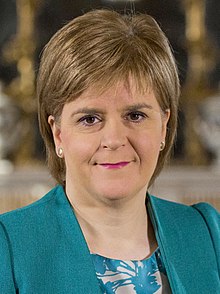Nicola Sturgeon
Nicola Ferguson Sturgeon (born 19 July 1970) is a Scottish politician serving as the fifth First Minister of Scotland and the Leader of the Scottish National Party (SNP) since November 2014. She is the first woman to hold either position. Sturgeon has been a Member of the Scottish Parliament (MSP) since 1999, first as an additional member for the Glasgow electoral region from 1999 to 2007 and as the member for Glasgow Southside since 2007 (known as Glasgow Govan from 2007 to 2011).
Nicola Sturgeon MSP | |||||||||||||||||||||||||
|---|---|---|---|---|---|---|---|---|---|---|---|---|---|---|---|---|---|---|---|---|---|---|---|---|---|
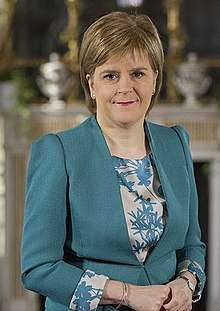 Sturgeon in 2017 | |||||||||||||||||||||||||
| First Minister of Scotland | |||||||||||||||||||||||||
| Assumed office 20 November 2014 | |||||||||||||||||||||||||
| Monarch | Elizabeth II | ||||||||||||||||||||||||
| Deputy | John Swinney | ||||||||||||||||||||||||
| Preceded by | Alex Salmond | ||||||||||||||||||||||||
| Leader of the Scottish National Party | |||||||||||||||||||||||||
| Assumed office 14 November 2014 | |||||||||||||||||||||||||
| Deputy | Stewart Hosie Angus Robertson Keith Brown | ||||||||||||||||||||||||
| Preceded by | Alex Salmond | ||||||||||||||||||||||||
| Deputy First Minister of Scotland | |||||||||||||||||||||||||
| In office 17 May 2007 – 20 November 2014 | |||||||||||||||||||||||||
| First Minister | Alex Salmond | ||||||||||||||||||||||||
| Preceded by | Nicol Stephen | ||||||||||||||||||||||||
| Succeeded by | John Swinney | ||||||||||||||||||||||||
| Depute Leader of the Scottish National Party | |||||||||||||||||||||||||
| In office 3 September 2004 – 14 November 2014 | |||||||||||||||||||||||||
| Leader | Alex Salmond | ||||||||||||||||||||||||
| Preceded by | Roseanna Cunningham | ||||||||||||||||||||||||
| Succeeded by | Stewart Hosie | ||||||||||||||||||||||||
| |||||||||||||||||||||||||
| Member of the Scottish Parliament for Glasgow Southside Glasgow Govan (2007–2011) | |||||||||||||||||||||||||
| Assumed office 3 May 2007 | |||||||||||||||||||||||||
| Preceded by | Gordon Jackson | ||||||||||||||||||||||||
| Majority | 9,593 (38.5%) | ||||||||||||||||||||||||
| Member of the Scottish Parliament for Glasgow (1 of 7 Regional MSPs) | |||||||||||||||||||||||||
| In office 6 May 1999 – 3 May 2007 | |||||||||||||||||||||||||
| Personal details | |||||||||||||||||||||||||
| Born | Nicola Ferguson Sturgeon 19 July 1970 Irvine, Ayrshire, Scotland | ||||||||||||||||||||||||
| Political party | Scottish National Party | ||||||||||||||||||||||||
| Spouse(s) | |||||||||||||||||||||||||
| Parents |
| ||||||||||||||||||||||||
| Residence | Bute House | ||||||||||||||||||||||||
| Alma mater | University of Glasgow | ||||||||||||||||||||||||
| Cabinet | |||||||||||||||||||||||||
| Signature | |||||||||||||||||||||||||
| Website | First Minister of Scotland | ||||||||||||||||||||||||
| ||
|---|---|---|
|
Salmond Ministry
First Minister of Scotland
|
||
A law graduate of the University of Glasgow, Sturgeon worked as a solicitor in Glasgow. After being elected to the Scottish Parliament, she served successively as the SNP's shadow minister for education, health, and justice. In 2004 she announced that she would stand as a candidate for the leadership of the SNP following the resignation of John Swinney. However, she later withdrew from the contest in favour of Alex Salmond, standing instead as depute (deputy) leader on a joint ticket with Salmond.
Both were subsequently elected, and as Salmond was still an MP in the House of Commons, Sturgeon led the SNP in the Scottish Parliament from 2004 to 2007. The SNP won the highest number of seats in the Scottish Parliament in the 2007 election and Salmond was subsequently appointed First Minister. He appointed Sturgeon as Deputy First Minister and Cabinet Secretary for Health and Wellbeing. She was appointed as Cabinet Secretary for Infrastructure, Investment and Cities in 2012. Following the defeat of the Yes Scotland campaign in the 2014 Scottish independence referendum, Salmond resigned and Sturgeon was elected unopposed as SNP leader in November 2014 and appointed as First Minister.[1][2]
Sturgeon led the SNP through the 2015 general election when it enjoyed a surge in support, recording a number of swings of over 30% from Labour, as it won 56 of the 59 Scottish seats and replaced the Liberal Democrats as the third-largest party in the British House of Commons. In the 2016 election, the Scottish Parliament was returned with a pro-independence majority with the SNP and the Scottish Greens. Although the SNP were two seats short of a majority, it was returned as the largest single party, with more than double the seats of the Scottish Conservatives; Sturgeon secured a second term as First Minister, forming an SNP minority government. In the 2016 UK referendum on EU membership, Scotland voted by 62% to remain in the European Union, despite Brexit receiving 52% of the vote across the UK.[lower-alpha 1] After the vote to leave the EU, the Scottish Parliament authorised the Scottish Government to seek a section 30 order to hold a second referendum on independence.
Early life and education
Nicola Ferguson Sturgeon[3] was born in Ayrshire Central Hospital in Irvine, on 19 July 1970.[4] She is the eldest of three daughters born to Joan Kerr Sturgeon (née Ferguson, born 1952), a dental nurse and Robin Sturgeon (born 1948), an electrician.[5] Her family has some roots in North East England; her paternal grandmother was from Ryhope in what is now the City of Sunderland.[6]
Sturgeon grew up in Prestwick and Dreghorn. She attended Dreghorn Primary School from 1975 to 1982 and Greenwood Academy from 1982 to 1988. She later studied at the University of Glasgow, where she studied Law. Sturgeon graduated with a Bachelor of Laws (Hons) in 1992 and a Diploma in Legal Practice the following year.[7] During her time at the University of Glasgow she was active as a member of the Glasgow University Scottish Nationalist Association and the Glasgow University Students' Representative Council.
Following her graduation, Sturgeon completed her legal traineeship at McClure Naismith, a Glasgow firm of solicitors, in 1995. After qualifying as a solicitor, she worked for Bell & Craig, a firm of solicitors in Stirling, and later at the Drumchapel Law Centre in Glasgow from 1997 until her election to the Scottish Parliament in 1999.[8]
Early political years
In an interview with the BBC's Woman's Hour, Sturgeon revealed that it was Margaret Thatcher who inspired her to enter politics, because, due to rising unemployment in Scotland at the time, she developed "a strong feeling that it was wrong for Scotland to be governed by a Tory government that we hadn't elected".[9]
Sturgeon joined the Scottish National Party (SNP) in 1986, having already become a member of the Campaign for Nuclear Disarmament, and quickly became the party's Youth Affairs Vice Convener and Publicity Vice Convener.[10][11] She first stood for election in the 1992 general election as the SNP candidate in the Glasgow Shettleston constituency, and was the youngest parliamentary candidate in Scotland, failing to win the seat.
Sturgeon also stood unsuccessfully as the SNP candidate for the Irvine North ward on Cunninghame District Council in May 1992, for the Baillieston/Mount Vernon ward on Strathclyde Regional Council in 1994, and for the Bridgeton ward on Glasgow City Council in 1995.
In the mid-1990s Sturgeon and Charles Kennedy went together on a political study visit to Australia.[12][13]
The 1997 general election saw Sturgeon selected to fight the Glasgow Govan seat for the SNP. Boundary changes meant that the notional Labour majority in the seat had increased substantially. However, infighting between the two rival candidates for the Labour nomination, Mohammed Sarwar and Mike Watson, along with an energetic local campaign, resulted in Glasgow Govan being the only Scottish seat to see a swing away from Labour in the midst of a Labour landslide nationwide. Sarwar did, however, win the seat with a majority of 2,914 votes.[14] Shortly after this, Sturgeon was appointed as the SNP's spokesperson for energy and education matters.
Election to Scottish Parliament, 1999
Sturgeon stood for election to the Scottish Parliament in the first Scottish Parliament election in 1999 as the SNP candidate for Glasgow Govan.[15] Although she failed to win the seat, she was placed first in the SNP's regional list for the Glasgow region, and was thus elected as a Member of the Scottish Parliament. During the first term of the Scottish Parliament, Sturgeon served as a member of the Shadow Cabinets of both Alex Salmond and John Swinney. She was Shadow Minister for Children and Education from 1999 to 2000, Shadow Minister for Health and Community Care from 2000 to 2003, and Shadow Minister for Justice from 2003 to 2004. She also served as a member of the Education, Culture and Sport Committee and the Health and Community Care Committee.[16]
Depute Leader and Deputy First Minister
On 22 June 2004, John Swinney resigned as Leader of the SNP following poor results in the European Parliament election. His then-depute, Roseanna Cunningham, immediately announced her intention to stand for the leadership. The previous leader, Alex Salmond, announced at the time that he would not stand.[17] On 24 June 2004, Sturgeon announced that she would also be a candidate in the forthcoming election for the leadership, with Kenny MacAskill as her running mate.[18]
However, Salmond later announced that he did intend to stand for the leadership; Sturgeon subsequently withdrew from the contest and declared her support for Salmond, standing instead as his running mate for the depute leadership. It was reported that Salmond had privately supported Sturgeon in her leadership bid, but decided to run for the position himself as it became apparent she was unlikely to beat Cunningham.[19] The majority of the SNP hierarchy lent their support to the Salmond–Sturgeon bid for the leadership, although MSP Alex Neil backed Salmond as leader, but refused to endorse Sturgeon as depute.[20]
The results of the leadership contest were announced on 3 September 2004, with Salmond and Sturgeon elected as Leader and Depute Leader respectively.[21] As Salmond was still an MP in the House of Commons, Sturgeon led the SNP at the Scottish Parliament until the 2007 election, when Salmond was elected as an MSP.[22]
As leader of the SNP in the Scottish Parliament, Sturgeon became a high-profile figure in Scottish politics and often clashed with First Minister Jack McConnell at First Minister's Questions. This included rows over the House of Commons' decision to replace the Trident nuclear weapon system, and the SNP's plans to replace council tax in Scotland with a local income tax.[23] Sturgeon defeated Gordon Jackson with a 4.7% swing to the SNP in the 2007 election in Glasgow Govan. The election resulted in a hung parliament, with the SNP the largest party by a single seat; the SNP subsequently formed a minority government. Sturgeon was appointed as the Deputy First Minister and Cabinet Secretary for Health and Wellbeing by First Minister Salmond. In the position she saw through party pledges such as scrapping prescription charges and reversing accident and emergency closures, she also became more widely known internationally for her handling of the 2009 flu pandemic.[24][25] She was supported in her role as Cabinet Secretary for Health and Wellbeing by Shona Robison MSP, the Minister for Public Health and Sport, and by Alex Neil MSP, the Minister for Housing and Communities.
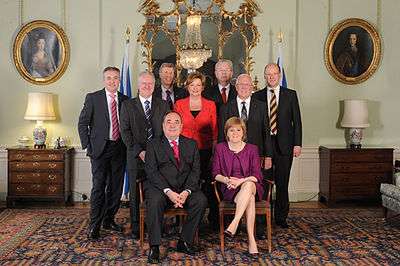
At the 2011 election, the SNP won a large overall majority. Sturgeon was retained as Deputy First Minister and Cabinet Secretary for Health and Wellbeing until a reshuffle one year later, when she was appointed as Cabinet Secretary for Infrastructure, Investment and Cities and an additional role overseeing the referendum on Scottish independence, essentially putting her in charge of the SNP's referendum campaign.[26] In December 2012, Sturgeon said that she believed that independence would allow Scotland to build a stronger and more competitive country, and would change spending priorities to address "the scandal of soaring poverty in a country as rich as Scotland".[27]
On 19 September 2014, independence was rejected in the Scottish independence referendum, with 55.3% of the voters voting no and 44.7% voting yes.[28] Following the defeat of the Yes Scotland campaign, Salmond announced his resignation as First Minister and Leader of the SNP. Sturgeon immediately announced that she would be a candidate in the election to replace him, and received huge support from the SNP hierarchy.[29][30][31] Sturgeon said that there would be "no greater privilege" than to lead the SNP. On Salmond's resignation, Sturgeon said:
The personal debt of gratitude I owe Alex is immeasurable. He has been my friend, mentor and colleague for more than 20 years. Quite simply, I would not have been able to do what I have in politics without his constant advice, guidance and support through all these years. [...] I can think of no greater privilege than to seek to lead the party I joined when I was just 16. However, that decision is not for today.
Following the referendum defeat, Sturgeon said that "further devolution is the route to independence".[32] She also opined that Scottish independence was a matter of "when, not if".[33]
Leadership of the Scottish National Party
On 24 September 2014, Sturgeon officially launched her campaign bid to succeed Salmond as Leader of the Scottish National Party at the November leadership election.[34][35] It quickly became apparent that no other candidate would be able to receive enough required nominations to run a credible leadership campaign.[36] During the speech launching her campaign, Sturgeon announced that she would resign as Depute Leader, triggering a concurrent depute leadership election; the MSPs Angela Constance and Keith Brown and the MP Stewart Hosie all nominated themselves to succeed Sturgeon as Depute Leader.[37][38]
Nominations for the SNP leadership closed on 15 October, with Sturgeon confirmed as the only candidate. SNP convener Derek Mackay publicly congratulated Sturgeon as de facto leader in waiting, saying that she would be "a fantastic new leader" for both the SNP and for Scotland.[39] On this date, Sturgeon also came out on top in a trust rating opinion poll, conducted for the SNP, which indicated that 54% of the Scottish population trusted her to "stand up for Scotland's interests".[40]
Sturgeon was formally acclaimed as the first female Leader of the SNP on 14 November 2014 at the Autumn Conference in Perth, with Hosie as her depute. This also effectively made her First Minister in waiting, given the SNP's absolute majority in the Scottish Parliament.[41] In her first speech as leader, Sturgeon said that it was "the privilege of her life" to lead the party she joined as a teenager.[42]
First Minister of Scotland
First term, 2014–2016
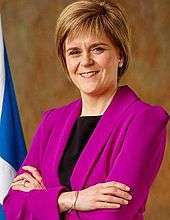
On 19 November 2014, Salmond formally resigned as First Minister of Scotland and the election for the new First Minister took place the following day. Sturgeon and Ruth Davidson, the leader of the Scottish Conservatives, stood for election. Sturgeon received 66 votes, Davidson received 15 and there were 39 abstentions. As mentioned above, the SNP's absolute majority made Sturgeon's election all but certain.[43] Sturgeon was formally sworn into office the following day.[44] On 20 November 2014, she was appointed to the Privy Council of the United Kingdom and therefore granted the style 'The Right Honourable'.[45] On 21 November, she unveiled her Cabinet with a 50/50 gender balance, promoting Finance Secretary John Swinney to become her Deputy First Minister.[46]
During her first First Minister's Questions after being sworn in, Sturgeon tried to strike a conciliatory tone, saying that she came into her new post "with an open mind and a willingness to hear proposals from all sides of the chamber."[47]
UK 2015 general election
Sturgeon took part in several Scottish and UK-wide TV election debates in the run up to the 2015 general election and according to opinion polls was regarded to have had a successful performance.[48] The SNP went on to win a landslide victory in Scotland, with 56 out of 59 seats.[49]
On 4 April 2015, a leaked memo from the Scotland Office alleged that Sturgeon privately told the French ambassador Sylvie Bermann that she would "rather see David Cameron remain as PM". This was in contrast to her publicly stated opposition to a Conservative Government on the run up to the election.[50] The memo was quickly denied by both Sturgeon and the French consulate.[51][52] It was later noted that the memo had contained a disclaimer that parts of the conversation may have been "lost in translation" and its release had been ordered by then Scottish Secretary Alistair Carmichael.[53][54] Sturgeon stated that Carmichael had "engaged in dirty tricks" and that he should consider his position as an MP.[55]
Scottish Parliament election, 2016
Sturgeon contested her first election as SNP leader at the 2016 election. The SNP fell two seats short of securing another overall majority, but remained the largest party in the chamber, with more than double the seats of the next-largest party, the Scottish Conservatives.[56][57]
Sturgeon was formally nominated for a second term on 17 May, defeating Lib Dem leader Willie Rennie by a vote of 63 to 5, with 59 members abstaining.[58]
Second term, 2016–present
2016 EU membership referendum
.jpg)
The UK Government held a referendum to decide the future of the United Kingdom's European Union membership in which all 32 council areas in Scotland voted by a majority for the United Kingdom to remain a member of the EU. Across Scotland, 62% of voters backed the UK remaining a member of the EU, with 38% voting for the UK to leave. Overall 52% of voters in the United Kingdom voted to leave the EU, with 48% voting to remain.[59]
In response to the result, on 24 June 2016, Sturgeon said that Scottish Government officials would begin planning for a second independence referendum.[60][61] Sturgeon claimed that it was "clear that the people of Scotland see their future as part of the European Union" and that Scotland had "spoken decisively" with a "strong, unequivocal" vote to remain in the European Union.[62] Sturgeon said it was "democratically unacceptable" that Scotland could be taken out of the EU "against its will".[63]
On 24 June, Sturgeon said she would communicate to all EU member states that Scotland had voted to stay in the EU.[64] An emergency Scottish cabinet meeting on 25 June agreed that the Scottish Government would seek to enter negotiations with the EU and its member states, to explore options to protect Scotland's place in the EU."[65][66] Sturgeon later said that while she believed in Scottish independence, her starting point in these discussions was to protect Scotland's relationship with the EU.[67] May's comments confirmed that the PM wanted the Scottish government to be "fully engaged" in the process.
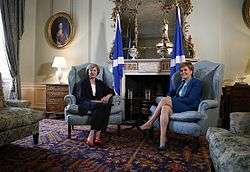
Future referendum on independence
Sturgeon confirmed in June 2016 that the Scottish government had formally agreed to draft legislation to allow a second independence referendum to take place.[68] As the constitution is a reserved matter under the Scotland Act 1998, for a future referendum on Scottish independence to be legal under UK law, it would need to receive the consent of the British Parliament to take place.[69]
Prior to the day the Prime Minister triggered Article 50, formally allowing the process of the United Kingdom leaving the European Union, the Scottish Parliament voted 69 to 59 in favour of another independence referendum.[70] By the end of that week, on 30 March 2017, Sturgeon wrote to the Prime Minister requesting a Section 30 order, formally devolving the responsibility and power to the Scottish Government to plan for and hold another referendum on Scottish Independence.[71] Previously, May and David Mundell, Secretary of State for Scotland, have both highlighted that as the negotiations begin with the European Union on the United Kingdom's withdraw, it is important for Scotland to work with the UK Government to get the best exit deal for both the United Kingdom and Scotland, stating that "now is not the time for another referendum".[72]
Following the 2017 UK general election, Nicola Sturgeon announced that the Scottish Government would postpone legislation pertaining to the proposed second referendum on Scottish independence until at least autumn 2018, when it is believed that the outcome of Brexit negotiations should become clearer.[73]
European Union membership
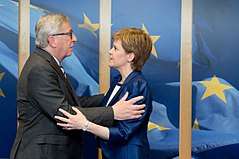
In response to the UK-wide vote for the United Kingdom to leave the European Union, the Scottish Government, headed by Sturgeon, launched the Scotland's Place in Europe document, a white paper setting out the Scottish Government's aims and wishes of Scotland's role in Europe post-Brexit. The paper was sent to the central British Government to be read by Prime Minister Theresa May.
In June 2017, Sturgeon criticised the approaches taken by both Theresa May and the British Government towards the Brexit approach, claiming that May "will struggle" as she is a "difficult person to build a rapport with". In the same interview, Sturgeon committed to no independence referendum being held prior to the terms of a UK wide Brexit deal being agreed and presented.[74]
With a view towards Brexit, Sturgeon demanded greater powers for the Scottish Parliament, arguing that Brexit is threatening Scotland's devolution settlement.[75] With London seeking to restrict immigration to the United Kingdom, she asserted that Scotland should be able to set its own immigration policy, as well as policies relating to employment and trade.[75]
Scottish local elections, 2017
Sturgeon and the SNP went into the Scottish council elections that were held on 4 May 2017, as the largest political party in the 32 local council areas in Scotland, having 424 councillors elected to serve on the councils across Scotland.[76] Publicly speaking about the 2017 Scottish council elections, Sturgeon has said that the elections were a clear choice between voting for herself and Ruth Davidson, the leader of the Scottish Conservative and Unionist Party, citing the stark fall in support of the Scottish Labour Party and their leader Kezia Dugdale over the past several years.[77]
While failing to win any outright overall control in any council area in Scotland, the SNP emerged as the largest political group in sixteen councils, including Glasgow, Edinburgh and Aberdeen for the first time. However, on a notional basis, the SNP suffered a net loss of 7 councillors compared to 2012. The party also lost its majorities in Angus and Dundee to no overall control.[78] Following the results, Sturgeon claimed that the election was a "clear and emphatic victory for the SNP', despite the large number of seats gained by the Scottish Conservatives.[79]
Alex Salmond sexual harassment case
In January 2019, Sturgeon referred herself to an independent ministerial ethics body, which will lead to an investigation into her actions with respect to a sexual harassment case concerning allegations against Salmond. This followed her admitting that she had a secret meeting and subsequent phone call with Salmond about the Scottish government's allegations against him. She raised these with the Permanent Secretary to the Scottish Government, Leslie Evans, two months later, rather than reporting them immediately, as she should if they constitute government matters (as per the ministerial code). Sturgeon argued that the meetings were SNP party matters, and thus not covered. The investigating panel will consist of Dame Elish Angiolini, a former Solicitor General for Scotland and lord advocate, and James Hamilton, a former director of public prosecutions in the Republic of Ireland.[80] On 15 January 2019 the Scottish Parliament agreed to hold its own inquiry into the matter.[81]
2019 European elections
Sturgeon led the SNP to victory in the European Parliamentary elections. The SNP won 3 out of the 6 seats in Scotland.
UK 2019 general election
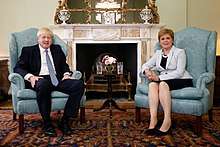
Sturgeon led her party to victory in the 2019 United Kingdom general election in Scotland. The SNP won 48 seats, and came second place in the 11 others; their 45% of the vote yielded 80% of the seats in Scotland.[82][82] Among the election casualties was Liberal Democrats leader Jo Swinson, who lost her seat in East Dunbartonshire. Sturgeon was branded as "ungracious" when she was filmed by Sky News celebrating Swinson's defeat. Sturgeon apologised for being overexcited although expressed that she was celebrating Amy Callaghan's win.[83][84][85][86] In the wake of the results, Sturgeon said that Prime Minister Boris Johnson has "no right" to stand in the way of another Scottish independence referendum after an "overwhelming" SNP election victory. She also said that the result "renews, reinforces and strengthens" the mandate for Indyref2.[87]
Coronavirus (COVID–19) outbreak
The worldwide outbreak of COVID-19 pandemic occurred during Sturgeon's second term as First Minister. To contain and limit the number of affected people in Scotland, Sturgeon and the Scottish Government highlighted a number of measures advised by NHS Scotland, initially maintaining effective hand washing.[88] The first confirmed case of the virus in Scotland was announced on 1 March 2020, when a resident in Tayside had tested positive. In the following days, Sturgeon issued further advice and guidance as the number of positive cases began to increase, but had said that closures of public places such as schools and shops "would be reviewed".[88]
Sturgeon announced to the Scottish Parliament on 18 March that all schools and nurseries in Scotland would close on 20 March to try and limit the spread of the virus.[89] On 23 March, Sturgeon issued a statement, placing Scotland on a "lockdown", limiting the reasons as to why people may leave their homes in an increase attempt to limit the spread of the virus, to protect the health of the population, as well as to ease the pressure the virus places on NHS Scotland services and workforce.[90]
International relations
While foreign policy remains a reserved matter,[91] Sturgeon has undertaken a number of visits to Europe, North America and Asia to promote Scotland as a place of investment and Scottish businesses to trade and do business with.[92][93][94] Sturgeon has committed to strengthening links between Scotland and the African continent.[95]
In response to the Brexit vote, to discuss Scotland's interests, Sturgeon travelled to Brussels to meet with both Jean-Claude Juncker, the President of the European Commission as well as Martin Schulz, the President of the European Parliament.[96][97]
United States
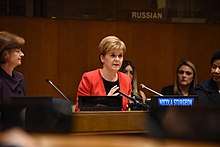
Sturgeon was highly critical of Donald Trump during the 2016 United States presidential election and had publicly backed his Democratic rival Hillary Clinton.[98] Sturgeon had been highly critical of Donald Trump and his policies, highlighting her disapproval of his language and views relating to sexism and misogyny, and stating upon Trump's victory that she hopes "Trump turns out to be a president different to the one he was during his campaign and reaches out to those who felt vilified by his campaign".[99] They subsequently spoke on the phone to discuss the future relationship and diplomatic approaches between both the United States and Scotland with Sturgeon wishing Trump well following his success. Sturgeon highlighted that "Scotland and the United States will continue to cooperate in those areas where we share common interests and goals, and when appropriate we will also look to have constructive dialogue on issues where our views differ".[100]
Sturgeon had also previously stripped Donald Trump of his ambassadorial role for Scottish businesses with the Scottish Government in the aftermath of Trump's views of an outright ban of Muslims from entering the United States. Sturgeon claimed following comments made by Trump in relation to Muslims entering the United States that he was "not fit" for the ambassadorial role with the Scottish Government.[100]
Spain
In the run up to the 2017 Catalan independence referendum, Nicola Sturgeon offered her own personal backing and that of the Scottish Government to Catalonia in the holding of a referendum.[101] The Government of Spain criticised Sturgeon, claiming she had "totally misunderstood" the situation in Spain and Catalonia.[101] Sturgeon has highlighted that Spain should follow "the shining example" that was created as part of the Edinburgh Agreement between the Scottish and British Governments that allowed Scotland to hold a legally binding referendum.[102]
Political views
.jpg)
Sturgeon has campaigned against replacing the Trident nuclear weapons system.[103] She has been a critic of austerity, saying that the UK government's "austerity economics" is "morally unjustifiable and economically unsustainable".[104]
Sturgeon has also campaigned on women's rights and gender equality, and is a self-described feminist; she has argued that Scotland's feminist movement is not simply symbolic, but "sends a powerful signal about equality".[105] She has hailed Scottish feminist economist Ailsa McKay as one of her inspirations.[106]
During the April 2019 SNP Conference held in Edinburgh, Sturgeon declared a "climate emergency". She argued that Scotland's carbon dioxide emissions are irrevocably causing sea levels to rise, which could have a negative impact on Scotland's prospects of achieving Independence.[107]
Awards and acknowledgements
Sturgeon won the Scottish Politician of the Year Award in 2008, 2012, 2014, 2015 and 2019.[108] In 2004, 2008 and 2011 she also won the Donald Dewar Debater of the Year Award at the same event, which is organised by The Herald newspaper.[109]
Forbes magazine ranked Sturgeon as the 50th most powerful woman in the world in 2016 and 2nd in the United Kingdom.[110][111] In 2015, BBC Radio 4's Woman's Hour assessed Sturgeon to be the most powerful and influential woman in the United Kingdom.[112]
Personal life
Sturgeon lives in Glasgow with her husband, Peter Murrell, who is the Chief Executive Officer of the SNP. The couple have been in a relationship since 2003. They announced their engagement on 29 January 2010,[113] and were married on 16 July 2010 at Òran Mór in Glasgow.[114] Her mother Joan was the SNP Provost of North Ayrshire council, where she was councillor for the Irvine East ward from 2007 until 2016.[115] In 2016, Sturgeon disclosed that she had miscarried five years previously.[116]
See also
Notes
- In the Brexit referendum, a majority of voters in every local authority area in Scotland voted to remain in 2016.
References
- Libby Brooks (19 September 2014). "Alex Salmond's resignation could give Nicola Sturgeon her day of destiny". The Guardian. Archived from the original on 9 December 2014. Retrieved 19 November 2014.
- Campbell, Glenn (13 November 2014). "The transition from Alex Salmond to Nicola Sturgeon". BBC News. Archived from the original on 17 November 2014. Retrieved 19 November 2014.
- "11 May Vol. 1, No. 1 Session 4". www.scottish.parliament.uk. 23 June 2011. Archived from the original on 24 September 2015. Retrieved 28 June 2017.
- Lockhart, Keely; Daunt, Joe (21 March 2016). "Nicola Sturgeon: SNP leader in 60 seconds". The Telegraph. Retrieved 17 July 2020.
- For her parents' names: "Sturgeon, Nicola", Who's Who 2014, A & C Black, an imprint of Bloomsbury Publishing plc, 2014; online edn, Oxford University Press, 2014 ; online edn, Nov 2014. Retrieved 9 May 2015 (subscription required).
- Rhodes, David (3 June 1015). "Sunderland roots of SNP's Nicola Sturgeon". BBC News. Archived from the original on 11 August 2015. Retrieved 3 June 2015.
- "Candidates and Constituency Assessments". Alba.org.uk. Archived from the original on 6 June 2011. Retrieved 17 January 2011.
- Sim, Philip (26 May 2017). "The Nicola Sturgeon story". BBC News. Archived from the original on 15 September 2017. Retrieved 21 November 2017.
- Sim, Philip (26 May 2017). "The Nicola Sturgeon story". BBC News. Archived from the original on 15 September 2017. Retrieved 14 September 2017.
- "Sturgeon: "Now or never" to banish Trident". Scottish National Party. 5 April 2014. Archived from the original on 8 July 2014. Retrieved 6 July 2014.
- "About: Nicola Sturgeon MSP". Scottish National Party. Archived from the original on 15 July 2016. Retrieved 2 July 2016.
- "Sturgeon on Charles Kennedy 'a most talented politician'". BBC News. 2 June 2015. Archived from the original on 2 June 2015. Retrieved 4 June 2015.
- Dathan, Matt (2 June 2015). "Nicola Sturgeon reveals how she and Charles Kennedy watched Trainspotting together as she pays tribute to former Lib Dem leader". independent.co.uk. Archived from the original on 3 June 2015. Retrieved 4 June 2015.
- "BBC Politics 97". Archived from the original on 24 March 2015. Retrieved 19 November 2014.
- "Nicola Sturgeon | Biography & Facts". Encyclopedia Britannica. Archived from the original on 8 October 2017. Retrieved 21 November 2017.
- "Nicola Sturgeon". The Scottish Parliament. Retrieved 3 February 2020.
- "Under-fire SNP leader resigns". BBC News. 22 June 2004. Archived from the original on 27 June 2004. Retrieved 17 January 2011.
- "Sturgeon contests SNP leadership". BBC News. 24 June 2004. Archived from the original on 2 July 2004. Retrieved 17 January 2011.
- Swanson, Ian. "Edinburgh News, "Salmond in shock bid for leader"". Edinburghnews.scotsman.com. Archived from the original on 21 September 2005. Retrieved 17 January 2011.
- Denholm, Andrew. "Scotsman.com, "Salmond's arch-rival buries hatchet with declaration of support"". Thescotsman.scotsman.com. Archived from the original on 1 November 2005. Retrieved 17 January 2011.
- Leonard, Ian (9 May 2015). "Why does Nicola Sturgeon not have a seat in Westminster?". Daily Mirror. Archived from the original on 17 August 2017. Retrieved 21 November 2017.
- "Salmond named as new SNP leader". BBC News. 3 September 2004. Retrieved 17 January 2011.
- "Parties clash on Trident and tax". BBC News. 15 March 2007. Archived from the original on 19 March 2007. Retrieved 17 January 2011.
- "The Nicola Sturgeon story". BBC News. 19 November 2014. Archived from the original on 12 December 2014. Retrieved 20 December 2014.
- "Rise of Nicola Sturgeon: from 'nippy sweetie' to SNP leader?". Channel 4 News. 24 September 2014. Archived from the original on 21 December 2014. Retrieved 20 December 2014.
- "Scottish cabinet reshuffle: Nicola Sturgeon given new independence role". BBC News. 5 September 2012. Archived from the original on 31 October 2015. Retrieved 6 July 2014.
- Carrell, Severin (25 May 2012). "Scottish independence would allow economy to grow, says Sturgeon". The Guardian. London. Archived from the original on 21 December 2016.
- "Scottish independence referendum: final results in full". the Guardian. Archived from the original on 18 November 2014. Retrieved 19 November 2014.
- "Scottish referendum results: As Alex Salmond steps down, Nicola Sturgeon waits for her chance to lead". The Independent. Archived from the original on 7 December 2014. Retrieved 19 November 2014.
- "Alex Salmond Resigns: Will SNP Deputy First Minister Nicola Sturgeon Replace Him?". International Business Times UK. Archived from the original on 2 December 2014. Retrieved 19 November 2014.
- "Scottish independence: referendum results – live – The Daily Telegraph". Telegraph.co.uk. 19 September 2014. Archived from the original on 20 October 2014. Retrieved 19 November 2014.
- "Nicola Sturgeon: 'Devo is route to independence'". Archived from the original on 12 November 2014. Retrieved 19 November 2014.
- "'Scottish Independence is a When Not an If' says Nicola Sturgeon". International Business Times UK. Archived from the original on 29 November 2014. Retrieved 19 November 2014.
- Severin Carrell. "Nicola Sturgeon launches campaign to succeed Alex Salmond". the Guardian. Archived from the original on 16 October 2014. Retrieved 19 November 2014.
- "Nicola Sturgeon predicts independence 'one day' as she launches bid to replace Alex Salmond". Telegraph.co.uk. 24 September 2014. Archived from the original on 14 October 2014. Retrieved 19 November 2014.
- "BBC News – Nicola Sturgeon backed by former SNP leader Gordon Wilson to replace Salmond". BBC News. Archived from the original on 21 October 2014. Retrieved 19 November 2014.
- "Keith Brown and Stewart Hosie stand for SNP deputy leadership". Telegraph.co.uk. 25 September 2014. Archived from the original on 13 November 2014. Retrieved 19 November 2014.
- "Angela Constance: 'I know why Yes campaign failed'". Archived from the original on 10 November 2014. Retrieved 19 November 2014.
- "SNP leadership elections close". SNP. SNP. Archived from the original on 17 October 2014. Retrieved 15 October 2014.
- "Nicola Sturgeon tops politician trust rating poll". The Scotsman. 3 October 2014. Archived from the original on 13 November 2014. Retrieved 19 November 2014.
- "New SNP leadership team: Sturgeon and Hosie". Archived from the original on 17 November 2014. Retrieved 19 November 2014.
- "SNP conference: Nicola Sturgeon appointed party leader". BBC News. 14 November 2014. Archived from the original on 17 November 2014. Retrieved 19 November 2014.
- "Nicola Sturgeon is elected first minister of Scotland". BBC News. 19 November 2014. Archived from the original on 20 February 2015. Retrieved 28 January 2016.
- "Nicola Sturgeon sworn in as First Minister". The Scotsman. Johnston Press. 20 November 2014. Archived from the original on 23 November 2014. Retrieved 23 November 2014.
- "Privy Council appointments: November 2014". Press release. Prime Minister's Office, 10 Downing Street. 20 November 2014. Archived from the original on 10 January 2015. Retrieved 16 April 2015.
- "Nicola Sturgeon announces Scottish cabinet with equal gender balance". The Guardian. 21 November 2014. Archived from the original on 14 May 2015. Retrieved 2 May 2015.
- Nicola Sturgeon officially sworn in as Scotland's First Minister. STV News, 2014-11-20.
- "Polls "confirm Nicola Sturgeon TV debate success"". The Scotsman. 21 April 2015. Archived from the original on 18 May 2015. Retrieved 13 May 2015.
- "BElection 2015: SNP wins 56 of 59 seats in Scots landslide". BBC News. 8 May 2015. Archived from the original on 21 May 2015. Retrieved 29 May 2015.
- John, Simon (3 April 2015). "Nicola Sturgeon secretly backs David Cameron". telegraph.co.uk. Archived from the original on 21 April 2015. Retrieved 26 May 2015.
- Smith, Lewis (3 April 2015). "'Categorically, 100%, untrue': Nicola Sturgeon denies telling French ambassador she wants the Tories to win the election". The Independent. Independent Print Limited. Archived from the original on 17 June 2015. Retrieved 17 June 2015.
- "French consul general denies Nicola Sturgeon Tory comments". BBC News. 4 April 2015. Archived from the original on 7 April 2015. Retrieved 29 May 2015.
- Settle, Michael. "Carmichael caught in his own tangled web of deceit". HeraldScotland.com. Archived from the original on 26 May 2015. Retrieved 23 May 2015.
- "Alistair Carmichael rejects calls to resign over leaked Nicola Sturgeon memo". BBC News. 25 May 2015. Archived from the original on 27 May 2015. Retrieved 29 May 2015.
- "Nicola Sturgeon condemns Alistair Carmichael leak 'dirty tricks'". BBC News. 22 May 2015. Archived from the original on 25 May 2015. Retrieved 29 May 2015.
- "New MSPs to arrive at Holyrood for first day". BBC News. BBC. 9 May 2016. Archived from the original on 9 May 2016. Retrieved 9 May 2016.
- "Election 2016: Before-and-after and party strength maps". BBC News. BBC. 6 May 2016. Archived from the original on 9 May 2016. Retrieved 9 May 2016.
- "Nicola Sturgeon wins Scottish first minister vote". BBC News. BBC. 17 May 2016. Archived from the original on 17 May 2016. Retrieved 17 May 2016.
- "EU Referendum Results". BBC News. Archived from the original on 24 June 2016.
- Jamieson, Alastair (24 June 2016). "Scotland Seeks Independence Again After U.K. 'Brexit' Vote". NBC News. Archived from the original on 24 June 2016.
- De Freytas-Tamura, Kimiko (25 June 2016). "Scotland Says New Vote on Independence Is 'Highly Likely'". The New York Times. Archived from the original on 16 February 2017.
- Dickie, Mure (24 June 2016). "Scots' backing for Remain raises threat of union's demise". Financial Times. Archived from the original on 27 June 2016.
- "Second Scotland Referendum 'Highly Likely'". Sky News. 24 June 2016. Archived from the original on 24 June 2016.
- "Nicola Sturgeon says second Scottish referendum 'highly likely' – as it happened". The Guardian. 24 June 2016. Archived from the original on 11 December 2016.
- Carrell, Severin; Rankin, Jennifer (25 June 2016). "Sturgeon to lobby EU members to support Scotland's bid to remain". The Guardian. Archived from the original on 3 January 2017.
- Kerr, Aidan (25 June 2016). "Sturgeon to seek EU talks to 'protect' Scotland's membership". STV News. STV. Archived from the original on 28 June 2016. Retrieved 27 June 2016.
- Press Association (28 June 2016). "Nicola Sturgeon says independence vote would be proposed 'if best or only way to protect EU place'". The Courier. Dundee, Scotland. Archived from the original on 29 June 2016. Retrieved 28 June 2016.
- "EU referendum: The 'stark difference' between Wales and Scotland". BBC News. 25 June 2016. Archived from the original on 28 June 2016.
- "Scotland Act 1998". Legislation.gov.uk. Archived from the original on 29 June 2016. Retrieved 25 June 2016.
- editor, Severin Carrell Scotland (28 March 2017). "Scottish parliament votes for second independence referendum". The Guardian. ISSN 0261-3077. Archived from the original on 6 April 2017. Retrieved 6 April 2017.CS1 maint: extra text: authors list (link)
- Osborne, Samuel (31 March 2017). "Nicola Sturgeon writes letter to Theresa May requesting second Scottish independence referendum". The Independent. Archived from the original on 19 August 2017.
- "Theresa May: 'Now is not the time' for indyref2". www.scotsman.com. Archived from the original on 1 April 2017. Retrieved 6 April 2017.
- Green, Chris (27 June 2017). "Voters want a break, says Nicola Sturgeon as she postpones IndyRef2". inews.co.uk. Retrieved 15 January 2019.
- Asthana, Anushka; Carrell, Severin (6 June 2017). "Nicola Sturgeon says 'difficult' Theresa May will struggle with Brexit talks". The Guardian. Archived from the original on 14 July 2017. Retrieved 8 July 2017.
- "Nicola Sturgeon calls for united front to protect devolution". www.scotsman.com. Archived from the original on 12 September 2017. Retrieved 14 September 2017.
- "BBC News – Vote 2012 – Scottish Council Results". BBC News. Archived from the original on 6 May 2017. Retrieved 28 June 2017.
- "Sturgeon: Council elections a choice between SNP and Tories". HeraldScotland. Archived from the original on 30 April 2017. Retrieved 28 June 2017.
- "Scotland local elections 2017". BBC News. Retrieved 11 January 2019.
- "Council election results: Sturgeon hails victory despite Tory surge". 5 May 2017. Archived from the original on 3 June 2017. Retrieved 28 June 2017 – via www.bbc.co.uk.
- editor, Severin Carrell Scotland (13 January 2019). "Sturgeon refers herself to ethics body over actions in Salmond case". The Guardian – via www.theguardian.com.CS1 maint: extra text: authors list (link)
- "MSPs to hold inquiry over Salmond row". 15 January 2019. Retrieved 15 January 2019.
- Sim, Philip (13 December 2019). "Election 2019: the result in Scotland in numbers". Retrieved 14 December 2019.
- Sky, Source; Reuters (13 December 2019). "Nicola Sturgeon filmed celebrating Jo Swinson's defeat to SNP's Amy Callaghan – video". The Guardian. ISSN 0261-3077. Retrieved 14 December 2019.
- "Nicola Sturgeon: 'I got overexcited' in reaction to Jo Swinson loss". Sky News. Retrieved 14 December 2019.
- "Nicola Sturgeon branded 'ungracious' after celebrating Jo Swinson losing her seat". www.scotsman.com. Retrieved 14 December 2019.
- Swindon, Peter. "Nicola Sturgeon tips East Dunbartonshire's Amy Callaghan to be one of the stars of the Commons". The Sunday Post. Retrieved 23 March 2020.
- "Sturgeon: PM has 'no right' to block Indyref2". 13 December 2019. Retrieved 14 December 2019.
- "Coronavirus: Some Scottish schools close for deep clean - BBC News". Bbc.co.uk. 16 March 2020. Retrieved 1 June 2020.
- "Coronavirus: Schools in Scotland and Wales to close from Friday - BBC News". Bbc.co.uk. Retrieved 1 June 2020.
- "Coronavirus: Nicola Sturgeon says new rules amount to 'lockdown' - BBC News". Bbc.co.uk. Retrieved 1 June 2020.
- "Archived copy". Archived from the original on 22 July 2017. Retrieved 9 July 2017.CS1 maint: archived copy as title (link)
- "Europe - gov.scot". Archived from the original on 23 June 2017. Retrieved 9 July 2017.
- "International relations - gov.scot". Archived from the original on 18 September 2017. Retrieved 9 July 2017.
- "International relations - gov.scot". Archived from the original on 23 June 2017. Retrieved 9 July 2017.
- "International development - gov.scot". Archived from the original on 23 June 2017. Retrieved 9 July 2017.
- "Protecting Scotland's role in the EU". 30 June 2016. Archived from the original on 10 October 2017. Retrieved 9 July 2017.
- "Schulz empfängt Schottin Sturgeon zu Gespräch über Brexit-Folgen". Frankfurter Allgemeine Zeitung (in German). 26 June 2006. Retrieved 19 August 2019.
- "Nicola Sturgeon breaks convention to back Hillary Clinton in Presidential race". 6 November 2016. Archived from the original on 1 October 2017. Retrieved 1 October 2017.
- "Sturgeon 'will not be silent' over Trump". BBC News. 10 November 2016. Archived from the original on 23 January 2017. Retrieved 1 October 2017.
- "Nicola Sturgeon congratulates Donald Trump on inauguration". 20 January 2017. Archived from the original on 1 October 2017. Retrieved 1 October 2017.
- "Sturgeon backs Catalan referendum calls". BBC News. 21 September 2017. Archived from the original on 5 October 2017. Retrieved 1 October 2017.
- "Iain Macwhirter: Madrid should have learned the lesson of the Scottish independence referendum". Archived from the original on 2 October 2017. Retrieved 1 October 2017.
- "Nicola Sturgeon signs 'Rethink Trident' pledge". Archived from the original on 7 December 2015.
- "Nicola Sturgeon attacks 'Westminster austerity economics'". Archived from the original on 3 October 2015.
- "Is post-referendum Scotland a feminist paradise?". The Guardian. Archived from the original on 21 December 2016.
- Beaton, Connor (6 March 2014). "Economics professor passes after cancer battle". The Targe.
- "Nicola Sturgeon declares Climate Emergency'". Archived from the original on 28 April 2019.
- "Nicola Sturgeon crowned 'Politician of the Year'". BBC News. 22 November 2019. Retrieved 3 February 2020.
- McKay, Girvan (2016). Written at [Place of publication not identified]. Lion and the saltire : a brief history of the Scottish National Party. Raleigh, N.C.: LULU.com. p. 90. ISBN 978-1-326-40090-3. OCLC 980517958.
- "The World's 100 Most Powerful Women". Forbes. Forbes.com LLC. Archived from the original on 12 August 2016. Retrieved 6 June 2016.
- "Nicola Sturgeon ranked second most powerful woman in UK". BBC News. 6 June 2016. Archived from the original on 6 June 2016. Retrieved 6 June 2016.
- "Nicola Sturgeon tops Woman's Hour power list". BBC News. July 2015. Archived from the original on 1 July 2015. Retrieved 1 July 2015.
- "Nicola Sturgeon announces wedding plans". STV News. STV. 29 January 2010. Archived from the original on 19 August 2017. Retrieved 10 September 2016.
- "Nicola Sturgeon ties the knot — but she won't be calling herself Mrs Murrell". The Scotsman. Johnston Press. 16 July 2010. Archived from the original on 19 September 2016. Retrieved 10 September 2016.
- "The Nicola Sturgeon story". BBC News. BBC. 19 November 2014. Archived from the original on 31 October 2016. Retrieved 10 September 2016.
- "Nicola Sturgeon miscarriage: First minister reveals baby loss". BBC News. BBC. 4 September 2016. Archived from the original on 7 September 2016. Retrieved 10 September 2016.
External links
| Wikimedia Commons has media related to Nicola Sturgeon. |
